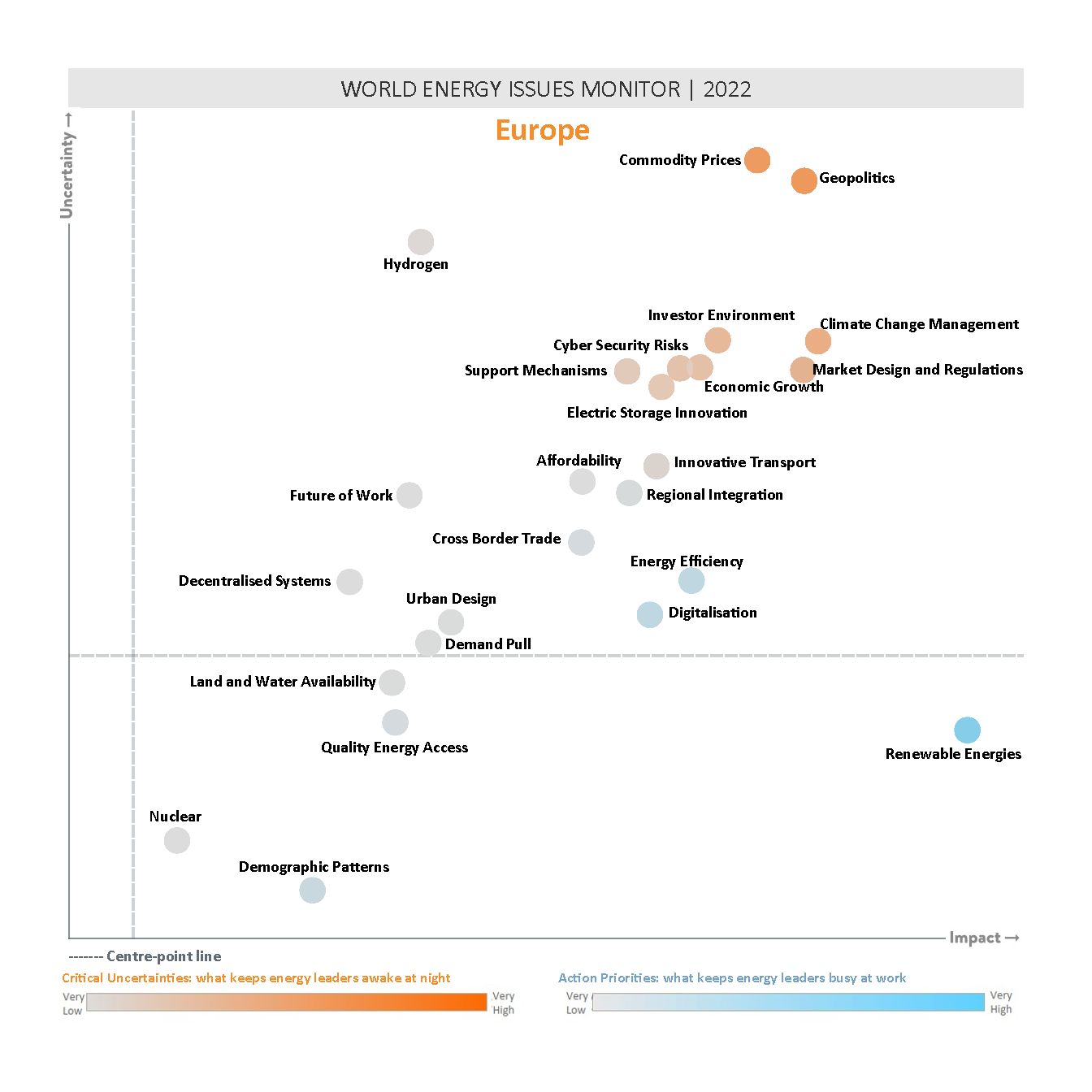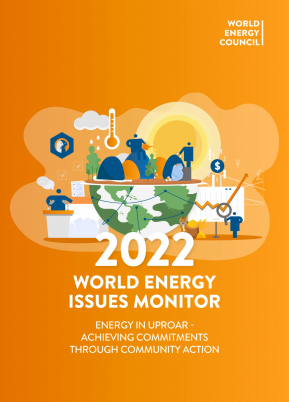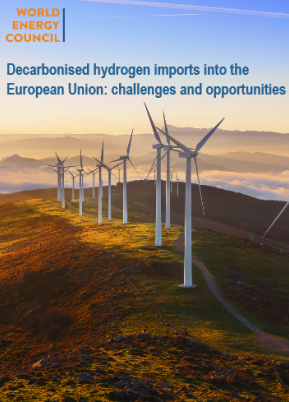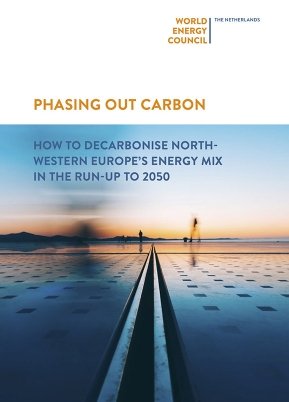Europe Network
The European regional network currently spans 30+ countries, from Iceland and Ireland in the West to Russia, Kazakhstan, Armenia, and Turkey in the East, including most European Union member countries. The large and diverse European regional community provides national Member Committees and their members with excellent opportunities to expand and deepen their network and engage around activities and events – from young energy professionals to CEO and Ministerial level – to drive action and achieve impact.
Regional action priorities that support the Council’s mission and humanising energy vision are agreed on an annual basis by national Member Committees in the framework of a Regional Action Plan. In 2021, European members joined forces to work on the Insights Briefing ‘Decarbonised Hydrogen Imports into the European Union: Challenges and Opportunities’ and formed a working group to activate the Council’s Humanising Energy vision in the region.
Each month, the European regional network meets to discuss matters of mutual interest, drive collective activities, and keep each other updated on relevant developments and events. In addition, throughout the year regionally targeted workshops are being organised to advance discussions in the context of our global insights and innovation tools.
Hydrogen has the potential to become the second main energy vector after electricity for the decarbonisation of energy consumption in end-use sectors. Its role in deep decarbonisation scenarios has been increasing in recent years, together with dedicated roadmaps and strategies that have been published in several countries. Under the guidance of a Steering Committee consisting of several European member committees, a study was undertaken by the European Network into Decarbonised Hydrogen Imports into the European Union: Challenges and Opportunities.
The Insights Briefing explores possible scenarios for consumption and production of decarbonised hydrogen in the European Union, in line with its net-zero greenhouse gas emissions goals. Cost estimates for the production and transportation of decarbonised hydrogen from various power sources are presented for several European and neighbouring countries, out to the 2030- and 2050-time horizons.
To access the recent hydrogen study, please click here.
Several European members formed a working group to engage stakeholders in the Humanising Energy conversation to:
- Raise awareness of the human and societal dimensions of the energy transition
- Exchange views, experiences and best practices on relevant topics related to Humanising Energy
- Enhance visibility of the Council and its national Member Committees in the region around this topic
In July 2021, a side-event to the Vienna Energy Forum was organised, focusing on the challenges and opportunities of Humanising Energy in Regional Energy Transitions. Participants discussed how to fairly manage the impacts on regions and societies of faster paced energy transitions and looked at how stakeholders can work together in the process to effectively join the dots between ‘races to zero’ and social justice agendas.
As part of World Energy Week LIVE 2021, a conversation focusing on Active energy citizens: At the heart of the energy transition was convened. Participants explored how to ensure that all citizens, communities, and societies – including the most vulnerable – are involved in a clean and just energy transition.
Several countries in the region have developed national Future Energy Leaders Programmes. Periodically, events are organised to bring together the broad Future Energy Leaders community in Europe as well as European FEL-100 to network and engage in conversations around various energy topics. Webinars organised in 2021 include ‘How to Boost Renewables to Meet the EU Climate Target?’ and ‘The Future of Natural gas in the Energy System – a European Perspective’.
Energy in Europe

REGIONAL OVERVIEW & CONTEXT
Following the global trend in this year’s Issues Monitor, there is an increase in uncertainty across most issues, with Commodity Prices and Geopolitics standing out as the region’s Critical Uncertainties. Both these issues are strongly influenced by energy security concerns and significant price hikes, particularly in gas prices, being experienced across Europe. The rapidly unfolding Russia-Ukraine situation is significantly adding to these pressures and concerns.
Hydrogen continues to be viewed with a high degree of uncertainty, but is not yet making a significant impact, whilst Nuclear also appears on the Action Priority horizon.
Renewable Energies continue to be the focus for Action Priority across the continent, whilst Quality Energy Access assumes greater uncertainty as the pandemic continues to impact working patterns and transport.
EUROPE DEEP DIVE
Results are ‘on trend’, in that Europe’s results reflect the world energy mood. Uncertainty has not decreased in the past year, despite the improved COVID situation. Geopolitics is playing an important role in this environment of continued uncertainty, resulting in energy security and affordability concerns.
The Challenge: Energy security and affordability
The challenges of an uneven post-COVID recovery, a long winter, and regional extreme weather events, such as hurricanes, have all influenced the current high gas prices, which also impact electricity prices. Carbon prices are currently at around EUR80 per ton, and energy prices are higher and almost certainly not coming down to previous levels. Energy leaders predict that volatility in electricity prices is likely here to stay, or even increase. Gas demand is increasing due to harsh European winters and a greater proportion of renewables in the electricity mix. In parallel, there is an increase in supply tensions related to geopolitics across the region.
High commodity prices have a strong impact on domestic consumers, with price volatility inducing affordability issues, which are likely to move to the Action Priority segment of the Issues Map. Bankruptcy among energy traders is increasingly becoming an issue and raises questions about whether increased security measures will be required to secure supply.
Whilst understandably focusing on gas, oil and electricity as key commodities, it is worth noting that the availability of critical metals and human capital (knowledge and expertise) are both factors that contribute to the energy security dimension.
From our World Energy Trilemma, Europe scores low on energy security (particularly if Russian supplies are removed from the mix), exposing disparities in domestic resource availability and import/export balances, as well as flaws in governance of energy and electricity security, which is bringing into question market design and regulation across the region.
"Investment in clean energy is rising, but not nearly enough to meet demand, and the phase out of fossil fuel generation.
Andrei Covatariu, Co-founder, ECERA / Member of the Task Force on Digitalization in Energy, United Nations Economic Commission for Europe
The Opportunity: Is there an opportunity around nuclear?
Nuclear has a positive impact on sustainability, but debates surrounding its deployment are on-going. Nuclear is not clearly defined as a priority at a regional level, though many countries are planning on building new reactors. Nuclear may evoke a different result in the current environment, due to taxonomy debates on whether nuclear and gas should stay in the energy mix long-term. The issue is more on the agenda now than last year. But, is taxonomy the right approach to deal with technology issues?
There are two distinct views on the role of nuclear in Europe:
- Nuclear in Europe is like the rest of the world. It will be important in some countries but, in general, is not on the horizon. It can be considered as a technology that in general terms won’t have a huge impact in the future.or:
- Nuclear is a low carbon and reliable source of dispatchable generation. Costs are predictable, which is very important under current price uncertainty. Given the current focus on sustainability and expected demand growth, increasing nuclear capacity may be an affordable solution to fight global warming. The UN economic commission report shows nuclear power releases less carbon emissions than any other energy source. It also points to the need to have a technology-neutral approach.
"All of the price fluctuation are really due to geopolitics and consequent commodity prices increases and this is being confused with the energy transition, which is in fact the solution. This of course explains why Climate Change management is one of the critical uncertainties.
Fergal McNamara, Manager, Regulation and Policy, ESB / Chairman Distribution and Market Facilitation Committee, Eurelectric / Chair, Ireland Member Committee, World Energy Council
Climate Change Management is focused on the EU Green Deal, but there is significant uncertainty around what policy is implemented and how. For example, carbon pricing is controversial and there is uncertainty as to whether it will be included within the Green Deal. There is a need to ensure that investments in decarbonised resources are made at the right level and at a pace that supports climate targets. It will also be necessary to maintain security of gas and oil supply over the coming years. These efforts must be carefully planned, with practical measures, otherwise energy price volatility could increase dramatically, potentially putting the energy transition at risk.
Downloads

Regional Perspectives - World Energy Issues Monitor 2022
Download PDF
World Energy Issues Monitor 2022
Download PDF
Decarbonised hydrogen imports into the European Union: challenges and opportunities
Download PDF
Phasing Out Carbon - How to decarbonise North-Western Europe's energy mix in the run-up to 2050
Download PDF





_368_520_s_c1_c_c.png)





